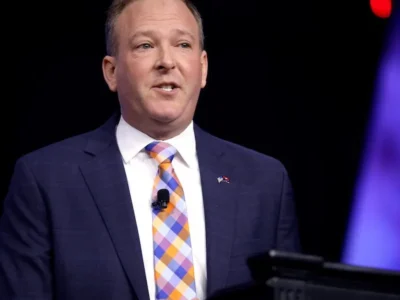The Trump Administration Is Trying an End Run Around Revoking California’s Car and Truck Rules
Legal Planet: Environmental Law and Policy 2025-02-17

 Last Friday, EPA’s Administrator Lee Zeldin announced a new and unprecedented way to try to prevent California from implementing its ambitious program to move toward 100 percent zero emission vehicles. This time around, the Trump Administration is trying a new tactic. Rather than revoking EPA’s decision (called a waiver) to allow California’s program to move forward by using standard administrative procedures, as EPA did during Trump’s first term, Zeldin is trying to use the Congressional Review Act to do so. Despite this unprecedented use of the CRA, most of the press seems not to have noticed given the non-stop shock and awe campaign the White House has engaged in since Day 1 of the Administration.
Last Friday, EPA’s Administrator Lee Zeldin announced a new and unprecedented way to try to prevent California from implementing its ambitious program to move toward 100 percent zero emission vehicles. This time around, the Trump Administration is trying a new tactic. Rather than revoking EPA’s decision (called a waiver) to allow California’s program to move forward by using standard administrative procedures, as EPA did during Trump’s first term, Zeldin is trying to use the Congressional Review Act to do so. Despite this unprecedented use of the CRA, most of the press seems not to have noticed given the non-stop shock and awe campaign the White House has engaged in since Day 1 of the Administration.
The CRA requires agencies to submit rules it plans to issue to Congress, but even more importantly, the Act allows Congress to reject rules that were adopted at the end of a President’s term. Republicans have already introduced numerous resolutions to overturn Biden Administration rules adopted in the last six months of Biden’s term. But Zeldin’s actions face a major problem: the Congressional Review Act doesn’t cover administrative actions like the California waivers and Congress can’t use the CRA to overturn them.
Trump has made no secret either of his antipathy toward zero emission vehicles or of his intent to revoke the special authority California has under the Clean Air Act to issue its own vehicle pollution standards. California really has no choice but to turn increasingly to ZEVs if it is to meet the health-based air quality standards adopted by EPA itself, in addition to reducing its proportional share of the greenhouse gases that are causing worldwide climate disruptions. But the increasing availability of ZEVs has triggered an unrelenting campaign by Trump’s petroleum industry supporters to discredit electric vehicles and resist policies that make them more accessible and affordable. To date their efforts have not turned consumers away from electric vehicles, mainly because manufacturers have developed a huge array of different models that incorporate all kinds of computerized features and are fast and quiet as well as clean.. And of course the global community is adopting EVs at an even faster pace than the U.S.
The problem for California legally is that under the Clean Air Act, the state can’t issue tough emissions standards without EPA’s permission. But EPA has its own problem: under President Biden, the agency already granted California waivers to implement its Advanced Clean Car II program, its Advanced Clean Trucks rule, and something called the Omnibus Nox rule, which also applies to trucks. And the granting of the waivers are on very strong legal grounds because California needs them to meet tough federal air pollution standards that at least two regions of the state (Southern California and the Central Valley) are out of compliance with. For an explanation of the legal strength of the waivers EPA granted, see here.
If EPA tries to overturn the waivers by rescinding permission, California will surely challenge the recission of the waivers and has a very strong legal case. And rescinding the waiver takes months and months: in Trump 1 it took EPA 18 months to rescind the Advanced Clean Car I waiver. In the meantime the California rules remain in effect. So Zeldin is trying something new.
Republicans have increasingly turned to the Congressional Review Act to undo environmental policies. The CRA has two steps: it first requires agencies to submit rules to Congress before they will be published. Once a rule is finalized, the CRA allows the two houses of Congress to reject the rule by passing a joint resolution for the President’s signature. The consequences are serious: if signed by the President, the regulation is void and the agency is prohibited from acting to amend or substitute a “substantially similar” regulation .
The problem for Zeldin, though, is that the Congressional Review Act doesn’t apply to California waivers. The statute explicitly excludes from the process rules of “particular applicability.” The U.S. General Accountability Office has made absolutely clear that California waivers are not covered by the CRA, saying that a waiver “is an adjudicatory order not subject to the CRA.” And even Utah Republican Senator Mike Lee has admitted as much, acknowledging that “California’s CAA federal preemption waivers cannot be reviewed under the Congressional Review Act (CRA) because the waiver granted by EPA is not a rule as that term is defined in the CRA.” So Zeldin’s argument that EPA failed to submit the waiver decisions to Congress is simply wrong legally. Now he’s trying to redo what EPA wasn’t required to do: submit the waiver decisions to Congress. The next step will be to get Congress to overturn them.
The fact that the CRA doesn’t apply to California’s waivers probably won’t stop Congress from overturning them. The Administration’s assault on environmental policies is unrelenting. Then we will inevitably see a lawsuit to determine whether Congress has the power to invalidate a decision that isn’t included in the terms of the Congressional Review Act.